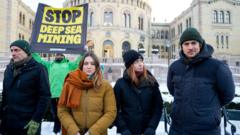Critics, including environmental scientists, warned that such actions could severely harm marine ecosystems. The project had faced opposition from 32 countries, including major players like France, Germany, and Canada. Prime Minister Jonas Gahr Stoer referred to the suspension as a "postponement," assuring that groundwork for regulations and environmental assessments would continue. Haldis Tjeldflaat Helle from Greenpeace Norway celebrated the hold, criticizing Norway for attempting to establish itself as a leader in ocean conservation while planning for potential ocean degradation.
Despite the delay, Norway remains the first nation to progress toward commercial deep-sea mining, with the initial plans approved in January. The government highlighted the importance of extracting minerals like lithium and cobalt, essential for advancing green technologies, as a motivation behind its initiative. However, reliance on domestic extraction has raised environmental alarm, especially amid calls from the EU and UK for a temporary prohibition on such practices due to the threat to marine biodiversity and climate health.
Concerns about the environmental impact of the mining plans had already prompted legal action from the World Wide Fund for Nature (WWF) Norway. Additionally, Norway's Institute of Marine Research indicated that a thorough environmental impact study could take an additional five to ten years. Meanwhile, some Norwegian companies, including Green Minerals, expressed concern over the suspension, anticipating delays of up to a year in their operations.
Despite the delay, Norway remains the first nation to progress toward commercial deep-sea mining, with the initial plans approved in January. The government highlighted the importance of extracting minerals like lithium and cobalt, essential for advancing green technologies, as a motivation behind its initiative. However, reliance on domestic extraction has raised environmental alarm, especially amid calls from the EU and UK for a temporary prohibition on such practices due to the threat to marine biodiversity and climate health.
Concerns about the environmental impact of the mining plans had already prompted legal action from the World Wide Fund for Nature (WWF) Norway. Additionally, Norway's Institute of Marine Research indicated that a thorough environmental impact study could take an additional five to ten years. Meanwhile, some Norwegian companies, including Green Minerals, expressed concern over the suspension, anticipating delays of up to a year in their operations.



















